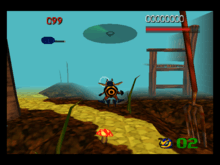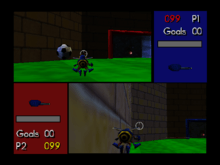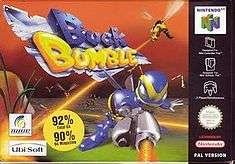Buck Bumble
| Buck Bumble | |
|---|---|
|
European Nintendo 64 cover art | |
| Developer(s) | Argonaut Games |
| Publisher(s) | Ubisoft |
| Designer(s) | Simon Keating |
| Platform(s) | Nintendo 64 |
| Release date(s) |
[1]‹See Tfd›
‹See Tfd›
‹See Tfd›
|
| Genre(s) | Action |
| Mode(s) | Single-player, multiplayer |
Buck Bumble (バックバンブル Bakkubanburu) is an action video game for the Nintendo 64 developed by British video game company Argonaut Games and released by Ubisoft in 1998. A special 'Buck Bumble' rumble pack was packaged with the UK version.[2]
Plot
The year is 2010, and as the result of a previous spill at a chemical factory in London, England, the insects in the surrounding area have mutated. Several different types of these mutated insects gather together becoming the evil "Herd", who are bent on taking over the garden, and eventually the whole world. The game casts the player as a Buck Bumble, a volunteer bumblebee that gets implanted with cyborg technology. He is part of an organization known as "The resistance", that is trying to stop the evil Herd Army. Buck's missions send him to defend the resistance base, attacking Herd supply lines, while traveling through sewers, and eventually fighting the Herd's mantis style Queen.
Gameplay

Buck can be armed with up to 11 different weapons, including such realistic weapons as a stun gun, a laser, a rocket launcher, and a guided missile launcher. While the levels are height restricted, Buck can fly around in 19 missions, some requiring the placement of a bomb without dropping it. The player or players in two player mode can also perform various aerial acrobatics, similar to a fighter plane, in fact it was originally programmed as a flight game before it "evolved into a flying bee".[3] The player controls the bee with moves such as loops and banking to the sides. At the top of the screen the player is given, a radar screen which they can use to locate enemies within the level, a damage meter, and the players current weapon. One level can have multiple location which the player can reach by passing through teleporters, or gates. There are several items the player can collect while in each level, such as weapons, nectar from flowers to regain energy, and even points bonuses. Several of the games enemies such as beetles and wasps have special generators that release another enemy when the first enemy is destroyed, requiring the player to destroy the generator itself to defeat the enemies and clear the stage. Besides the enemies, the player can also be harmed by a contact with water, and can be drowned, if in it to long. As well as Buck having to avoid exploding mushrooms.[4]
Multiplayer

Buck Bumble has two multiplayer modes. The first, Buck Battle, allows up to two players to engage in an airborne dog-fight on a preset map. The second is a football-style game called Buzz Ball. The goal is to hit a giant football into the opposing player's net. Just like in Buzz Battle, the player has the ability to kill his or her opponent in the process. Players are able to use two weapons from the game; a simple zapper, which gently moves the ball along, and a rocket launcher, which sends the ball flying in a different direction.
Development

The game was built with the rumble feature in mind, allowing the player to feel when they are hit, increasing the realism. This feature of the game was capitalized on by the company Joy Tech, which made an official 'Buck Bumble Pack' which was sold with the game exclusively at Dixons&Currys,[5] however it was a third-party peripheral not licensed by Nintendo.[2] The games soundtrack was composed by Justin Scharvona[6] and consists entirely of UK Garage and House music which at the time of the games release was largely popular in England.
Reception
| Reception | ||||||||||||||||||||||||||||||||
|---|---|---|---|---|---|---|---|---|---|---|---|---|---|---|---|---|---|---|---|---|---|---|---|---|---|---|---|---|---|---|---|---|
| ||||||||||||||||||||||||||||||||
While not heavily praised, and widely regarded as below contemporary N64 standards, Buck Bumble was met with overall positive reception from various gaming critics. Narayan Pattison of the Australian magazine N64 Gamer gave the game several compliments, comparing it to Star Fox for the Super Nintendo Entertainment System, which was also partly developed by Argonaut Games, saying that it avoids Star Fox's "restricted preset paths that had to be followed." They also compliment the game's designers for the added features, like the player being able to hover in the air, and drop down and walk across the ground, thus giving the player "the ability to try some new gameplay techniques that have never been used before." He describes the game's main theme as being a "very catchy dance beat that even has clear vocals." However, he was disappointed with the game's thick fog, repetitive textures, and that the save feature after each level, "makes the game too easy".[10]
Matt Casamassina of IGN called it "the epitome of 'first generation' Nintendo 64 products" and compared it to a lower quality version of the bee level in Banjo-Kazooie. This is largely due to its heavy distance fog, low frame rate, and low resolution graphics. Casamassina also considered the single player levels too short and too easy. However, he praised the flying controls, the design of the title character, and addictiveness of the Buzz Ball multiplayer mode.
Fabian Blache, III, of Dimension Publishing's Q64 magazine, compared the game's shooter style to the PlayStation game WarHawk. His first response to seeing the game was: "I was almost dreading having to labor through (what I perceived would be) inane gameplay at the hands of a childish premise." While praising the sound, and graphics, he excused the presence the fog, in the fact that, "the game is set in England." He finishes the review with "There aren't many games of this quality on the market today, and Argonaut should be proud to have this one as their own."[13]
Another positive review came from Nintendojo. They stated that, while fog makes navigation difficult, "the graphics do not disappoint." In terms of multiplayer, the "extremely difficult" Buzz Battle was considered much less enjoyable than Buzz Ball. The review summed up stating, "Buck Bumble is definitely worth playing. While it isn't perfect, it's a fun game, and that's what really counts."
GameSpot's Lauren Fielder gave the title a significantly lower review than most publishers and echoed the belief that it "missed the boat" of lower quality, first generation N64 games. She criticised the flying and walking controls and deemed the multiplayer modes "seemingly quite literally thrown in." She closed by saying "In spite of all the obvious flaws, Buck Bumble is not a terrible game. It's just not a good game, and the rewards do not make up for the dull, tugging experience it quickly becomes."
See also
- A Bug's Life (video game), a similar insect related game, released about the same time as Buck Bumble.
- Ecco the Dolphin, a game where a dolphin must solve puzzles to unlock new areas, defeat enemies.
- Excitebike 64, a motorcycle racing game with similar soccer based mini game.
- Kolibri (video game), a side scrolling shooter game, involving a hummingbird.
References
- ↑ http://www.gamerankings.com/n64/196835-buck-bumble/images.html
- 1 2 http://uk.ign64.ign.com/articles/065/065865p1.html IGN.com, News on Buck Bumble Exclusive Rumble Pak.
- ↑ Nintendo Power, Volume 113, page 46.
- ↑ Buck Bumble: Prima's Official Strategy Guide, by Stevie Case, Prima Publishing Inc., ISBN 0-7615-1910-6
- ↑ Buck Bumble Pack's packaging, sold with the game upon its release, exclusively through Dixons & Currys.
- ↑ http://www.allgame.com/game.php?id=14261&tab=credits
- ↑ Buck Bumble GameRankings.com. Retrieved on 6-18-09.
- ↑ "Buck Bumble" game's overview, review score and statistics information.
- ↑ GameSpot.com
- 1 2 N64 Gamer, Issue 9, pages 36-39. november 1998, NextPublishing Pty Ltd.
- ↑ Nintendo Power, 114, November 1998, page 124. Nintendo of America Inc. Review and overall rating of 'Buck Bumble' gameplay.
- ↑ Nintendo Official Magazine, Issue 74, page 42.
- 1 2 Q64, Volume 2, Winter 1998, page 43. Dimension Publishing Inc.
